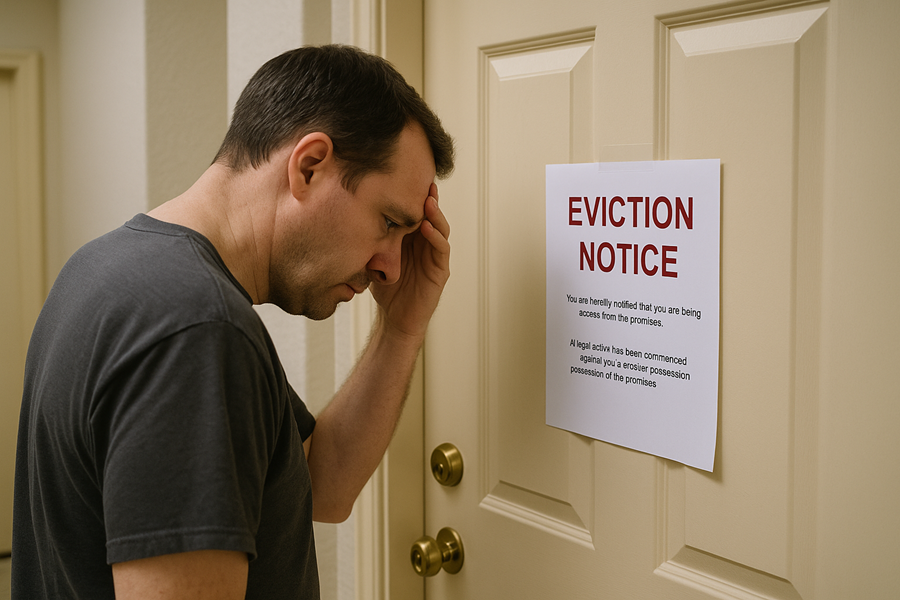Unlawful eviction & harassment from landlord

In the UK, tenants’ rights are protected by a robust legal framework that aims to ensure housing security and stability. However, some landlords still engage in abusive practices, such as unlawful eviction or landlord harassment, which undermine households and violate their dignity. The Protection from Eviction Act 1977 and other legislation clearly state that no tenant can be evicted without a court order, and that any attempt at intimidation or pressure constitutes an offence. In these situations, it is often essential to seek the assistance of a solicitor specialising in landlord & tenant law in order to assert one’s rights and obtain compensation.

KEY TAKEAWAY: How can a tenant in the UK effectively protect themselves against illegal eviction or harassment by their landlord?
Continue reading to fully understand the scope of the rights guaranteed by UK law.
What is unlawful eviction in the United Kingdom?
Unlawful eviction occurs when a landlord attempts to make a tenant leave without following the legal procedure.
The legal definition of unlawful eviction
In the UK, the law is very strict: a landlord cannot evict a tenant without going through the courts. The Protection from Eviction Act 1977 states that eviction can only take place after a court order and, if necessary, the involvement of bailiffs appointed by the court. Even if a tenant is behind on rent or has breached certain terms of the tenancy, the landlord must follow the proper legal process.
Two main procedures are used:
- Section 21 notice: Allows the landlord to regain possession at the end of the tenancy without needing to prove any fault on the tenant’s part.
- Section 8 notice: Allows eviction before the end of the tenancy, but only for specific reasons (rent arrears, property damage, nuisance, etc.).
Situations that qualify as unlawful eviction
Eviction is considered unlawful whenever the landlord bypasses the required court process. Common examples include:
- Changing the locks without a court order.
- Threatening or intimidating the tenant to make them leave.
- The tenancy is still valid and has not legally ended.
- Removing the tenant’s belongings without court authorisation.
These actions constitute a serious breach of the law and make the landlord legally liable.
Legal consequences for the landlord
A landlord who carries out unlawful eviction faces severe penalties. Civil consequences may include substantial compensation for loss of housing and emotional distress suffered by the tenant. Criminal consequences may include significant fines or, in severe cases, imprisonment. UK courts take a firm stance to deter any attempt at abusive eviction.
What is landlord harassment in the UK?
Landlord harassment refers to any repeated actions intended to intimidate or disrupt a tenant’s normal enjoyment of their home. UK law, notably the Protection from Harassment Act 1997, prohibits such behaviour, and protects tenants from any form of pressure, intimidation, or deliberate nuisance.
Definition and legal framework
Harassment is defined by repeated or intentional actions that make the home uninhabitable or force the tenant to leave. UK courts view these practices as serious, as they threaten the tenant’s safety and well-being.
Examples of harassment by a landlord
The following actions are considered harassment:
- Cutting off essential services: Deliberately interrupting electricity, water, or heating.
- Unauthorised entry: Entering the property without written notice, except in emergencies.
- Threats or intimidation: Verbal or psychological pressure to force the tenant to leave.
- Excessive visits or intrusive surveillance: Repeated visits or installing monitoring devices abusively.
- Unjustified rent increases: Imposing excessive rent to push the tenant out.
Consequences and remedies for the tenant
A landlord found guilty of harassment may face fines, compensation payments, or, in severe cases, imprisonment.
Tenants should keep detailed records of incidents (emails, messages, photos, witness statements) and seek advice promptly from a solicitor specialising in property law, who can take the necessary steps to stop the harassment. It is also advisable to contact the local council housing team for practical and legal support.
How to prove unlawful eviction or landlord harassment?
To defend their rights, a tenant needs to gather solid evidence showing that the eviction or harassment has taken place. Well-organised documentation not only helps convince a court but also allows authorities to act quickly.
Types of evidence accepted
Several types of evidence are recognised by law and can demonstrate the landlord’s illegal behaviour:
- Written messages: SMS, emails, letters, or other correspondence from the landlord showing threats, pressure, or unlawful demands.
- Witness statements: From neighbours, family members, or colleagues who have seen intimidating behaviour or unauthorised entries.
- Official reports: Complaints to the police or interventions by social services.
- Photos and videos: For example, a changed lock, a cut-off electricity or heating supply, or belongings placed outside, documenting acts of eviction or harassment.
Documentation methods
The way evidence is collected and preserved makes a significant difference:
- Incident log: Record each event with date, time, and a detailed description of what happened and who was involved.
- Keep documents: Retain all invoices, letters, emails, and messages from the landlord to create a clear chronological record.
- Organise evidence: Group materials by type and date to make them easier to present to authorities or in court.
What to do in case of unlawful eviction or harassment?
When a tenant faces illegal or intimidating actions from their landlord, it is essential to act quickly and methodically to protect their rights and secure their home.
Initial steps
Before taking legal action, certain measures can help safeguard the situation:
- Do not leave the property voluntarily: Staying in the home ensures your rights are maintained and allows you to build a solid case.
- Contact the local council Housing Team: These teams can provide advice and support, verify the situation, and refer tenants to specialist services.
- Alert the police in case of immediate threat or danger: This ensures the tenant’s safety and produces official reports that can serve as evidence.
Legal remedies
If initial steps with the Housing Team or support services are insufficient, tenants can pursue legal remedies to stop illegal actions and seek compensation. The main steps include:
- Building a solid case: Gather all available evidence, such as written messages, emails, letters, photos, videos, police reports, and witness statements. Keeping a detailed incident log with dates, times, and descriptions of events helps present a clear chronological account.
- Requesting an injunction: Apply to the court for an order requiring the landlord to immediately stop any harassment or illegal actions. An injunction can prevent the landlord from entering the property without permission, cutting off essential services, or intimidating the tenant. Failure to comply exposes the landlord to further sanctions.
- Claiming damages: Request compensation for any harm suffered, including loss of housing, psychological stress, or additional expenses caused by the landlord’s illegal actions. The court assesses the extent of the damage and may award appropriate financial compensation.
- Property reinstatement: In cases of unlawful eviction, the tenant can ask the court to order immediate access to the home. This protects the tenant from further pressure or intimidation by the landlord.
- Monitoring and enforcing decisions: After obtaining injunctions or damages, it is important to ensure the landlord complies with the court’s decisions, using reports from local authorities or the police if necessary.
Do I need a solicitor in case of unlawful eviction or harassment?
In situations of unlawful eviction or harassment, hiring a solicitor is not mandatory, but it can greatly help protect your rights and manage the legal process. A solicitor specialising in landlord & tenant law can:
- Provide precise legal advice to help you understand your rights and determine the appropriate steps to take.
- Draft and submit legal documents such as applications for injunctions, reinstatement to the property, or claims for damages.
- Represent you in court, presenting evidence and arguing effectively to defend your rights.
- Organise and secure your case by collecting and structuring all evidence and documents clearly.
- Facilitate negotiations with the landlord to resolve the issue amicably whenever possible.
FAQs
Can I stay in the property if the landlord changes the locks without notice?
Even if the landlord has changed the locks, you do not lose your rights: this generally constitutes unlawful eviction. It is recommended to contact the police and the local council Housing Team immediately to secure access.
What if the landlord refuses to comply with a court order?
If the landlord does not comply with an injunction or court decision, additional sanctions can be applied, including fines or enforcement measures. It is important to notify the court immediately and, if necessary, seek follow-up from the Housing Team or the police.
Can I challenge a rent increase if the landlord is harassing me?
If the landlord attempts to increase rent whilst engaging in harassment, this may be challenged as unfair or retaliatory. Tenants can seek advice from the Housing Team, Citizens Advice, or the tribunal to contest the increase and protect their rights.
Unlawful eviction and harassment by a landlord are serious violations of tenants’ rights in the UK. Legal remedies exist to stop such practices and obtain compensation, thereby protecting tenants’ rights and well-being.
Protect your home and peace of mind!
Act now by contacting the Housing Team or a specialised solicitor to stop any unlawful eviction or harassment. Connect with a landlord & tenant solicitor through Qredible today.
KEY TAKEAWAYS:
- Unlawful eviction and harassment are serious violations of tenants’ rights in the UK protected by the Protection from Eviction Act 1977 and Protection from Harassment Act 1997.
- Tenants should stay in the property and act quickly by contacting the local council Housing Team, documenting all evidence, and reporting to police if necessary.
- Legal remedies include injunctions, reinstatement to the property, and compensation for damages. A specialist landlord & tenant solicitor can strengthen your case and represent you in court.
Articles Sources
- citizensadvice.org.uk - https://www.citizensadvice.org.uk/housing/renting-privately/eviction/
- england.shelter.org.uk - https://england.shelter.org.uk/housing_advice/eviction
- legislation.gov.uk - https://www.legislation.gov.uk/ukpga/1977/43/contents
- housing-ombudsman.org.uk - https://www.housing-ombudsman.org.uk/
- gov.uk - https://www.gov.uk/make-court-claim-for-money
Do you need a solicitor?
Find a solicitor on Qredible in just a few easy steps













